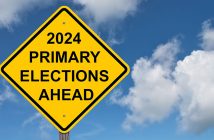
Former Budget Director David Stockman addresses the Fordham Wall Street Council Photo by Michael Dames
David Stockman, the former director of the Office of Management and Budget under President Ronald Reagan, gave a searing assessment of the nation’s economy and the Washington D.C. political establishment at the Graduate School of Business Administration’s Fordham Wall Street Council on Tues., October 22.
Stockman opened his talk at the New York Athletic Club by proudly acknowledging that his new book,The Great Deformation: The Corruption of Capitalism in America, had been panned by both liberals and conservatives alike for its unflinching and highly opinioned take on the 2008 financial crisis and the resulting aftermath. He noted that none other than Nobel Prize winning economist Paul Krugman, Ph.D, described his book as the “ravings of an old man.”
Stockman then proceeded to rave in detail about what he called, “Sundown in America,” an obvious riff on the famous Reagan 1984 campaign commercial “Morning in America.”
He described former Federal Reserve Chief Alan Greenspan as “the last disciple of Ayn Rand” who used a printing press in the basement of the Federal Reserve to print the money that got the country into its current jam. He was no less dismissive of newly nominated Fed chief Janet Yellen, who he referred to as “Bernanke on steroids.” While in turns caustic and humorous, Stockman was deadly serious about the Feds role in the crisis and sluggish recovery.
“You can’t make wealth by printing money,” he said. “The Fed has printed roughly $3 trillion out of thin air in the last eight or nine years, which has caused fiscal fraud and massive extortion in the capital markets.”
He said that the situation must be addressed but Congress is too polarized and corrupted by lobbyists to do anything about it. He added that the ideology of two parties has become “deformed over the decades” and unable to address the deficit that has become “structurally embedded” into the economy.
Stockman acknowledged that he was an early believer in so-called trickle-down economics when he was Reagan’s budget director from 1981 to 1985, but he has since been “excommunicated” by believers of the idea that tax breaks for the rich allow wealth to eventually trickle down to the poor and middle class. He added that he remained deeply concerned that “one tenth of one percent is making a killing by leveraging and speculating on the market [while]tens of millions of other people are buried in student loans, having their wages garnished.”
He said the Fed alone can not solve the problem of “this perverse transfer of income from the middle and bottom to the top,” but it could take its “big fat thumb” off the scale.
When asked by several members of the audience what he would advise the president to do if he were still budget director, he proposed three solutions:
First, he said that 10 million of the 55 million people on Social Security and Medicare, have enough income and should be cut back or eliminated entirely from the system.
“We don’t need to be paying millionaires $36,000 a year in social security benefits,” he said.
Second, the United States should dramatically demobilize defense.
“Let’s declare we are not the policemen of the world; we’ve been fired from that job anyway,” he said.
Finally, he said that the nation needs more revenue, which he added should be at least 20 percent of the gross domestic product. With too much consumption and too little employment, he said the current payroll tax system stunts job growth. He proposed replacing it with a value added tax or consumption tax instead.
“Let’s un-tax the jobs and let’s tax the consumption and try to get the country into some sort of sustainable balance,” he concluded.
“Do those three things and you have plan that would make a difference,” he said. “Is there any remote possibility that any of these things could get done? Absolutely not.”
Stockman predicted that only an “earth shattering crisis” will scare the American public into recognizing their government has been hijacked by banks. He predicted that although the crisis would be huge, it would be a deflationary one that wouldn’t be on par with the Great Depression.
“Hopefully it will force the American people to take back control of their government,” he said.


